Android中录音使用AudioRecord录音后的格式为pcm,要想播放需要转换格式,可以加入44字节的头转换为wav格式然后播放,但是我们要在网络上传输还是要把音频压缩一下,压缩为speex文件方便传输,节省流量,下面讲解怎样打speex的so库,和怎样使用speex在wav和spx文件之间相互转换。
1.在speex官网上下载speex源码 https://www.speex.org/downloads/
2.得到speex-1.2rc2.tar.gz ,然后解压缩得到speex文件夹内容如图
3.创建一个Android项目,命名为Speex,项目中新建jni目录,并把speex源码目录下的libspeex和include目录及其子目录文件全部拷贝到$project/jni目录下,拷贝完成如下图:
4.创建几个文件
- 在jni目录下新增Android.mk文件,复制如下内容(意思是编译speex_jni.cpp和libspeex下所有的c文件,有三个测试文件不用编译testenc_uwb.c、testenc_wb.c 、testenc.c )
LOCAL_PATH := $(call my-dir)
include $(CLEAR_VARS)
LOCAL_MODULE := libspeex
LOCAL_CFLAGS = -DFIXED_POINT -DUSE_KISS_FFT -DEXPORT="" -UHAVE_CONFIG_H
LOCAL_C_INCLUDES := $(LOCAL_PATH)/include
#LOCAL_SRC_FILES :=
LOCAL_SRC_FILES := speex_jni.cpp \
./libspeex/bits.c \
./libspeex/cb_search.c \
./libspeex/exc_10_16_table.c \
./libspeex/exc_10_32_table.c \
./libspeex/exc_20_32_table.c \
./libspeex/exc_5_256_table.c \
./libspeex/exc_5_64_table.c \
./libspeex/exc_8_128_table.c \
./libspeex/filters.c \
./libspeex/gain_table_lbr.c \
./libspeex/gain_table.c \
./libspeex/hexc_10_32_table.c \
./libspeex/hexc_table.c \
./libspeex/high_lsp_tables.c \
./libspeex/kiss_fft.c \
./libspeex/kiss_fftr.c \
./libspeex/lpc.c \
./libspeex/lsp_tables_nb.c \
./libspeex/lsp.c \
./libspeex/ltp.c \
./libspeex/modes_wb.c \
./libspeex/modes.c \
./libspeex/nb_celp.c \
./libspeex/quant_lsp.c \
./libspeex/sb_celp.c \
./libspeex/smallft.c \
./libspeex/speex_callbacks.c \
./libspeex/speex_header.c \
./libspeex/speex.c \
./libspeex/stereo.c \
./libspeex/vbr.c \
./libspeex/vorbis_psy.c \
./libspeex/vq.c \
./libspeex/window.c \
include $(BUILD_SHARED_LIBRARY)
- 在jni目录下增加Application.mk,复制内容如下(意思是编译所有平台下的so文件):
APP_ABI := all- 在jni/include/speex/目录下新增speex_config_types.h文件,复制内容如下:
#ifndef __SPEEX_TYPES_H__
#define __SPEEX_TYPES_H__
typedef short spx_int16_t;
typedef unsigned short spx_uint16_t;
typedef int spx_int32_t;
typedef unsigned int spx_uint32_t;
#endif
- 在包com.speex.util中新建SpeexUtil类,复制以下内容(主要定义native方法)
package com.speex.util;
/**
*
* @author jxn
* 2016年11月15日有更新,更改默认压缩比,并增加单例模式,重新打jar包
*/
public class SpeexUtil {
/*
* quality 1 : 4kbps (very noticeable artifacts, usually intelligible) 2 :
* 6kbps (very noticeable artifacts, good intelligibility) 4 : 8kbps
* (noticeable artifacts sometimes) 6 : 11kpbs (artifacts usually only
* noticeable with headphones) 8 : 15kbps (artifacts not usually noticeable)
*/
//设置为4时压缩比为1/16(与编解码密切相关)
private static final int DEFAULT_COMPRESSION = 4;
static {
try {
System.loadLibrary("speex");
} catch (Throwable e) {
e.printStackTrace();
}
}
private static SpeexUtil speexUtil = null;
SpeexUtil() {
open(DEFAULT_COMPRESSION);
}
public static SpeexUtil getInstance(){
if (speexUtil == null) {
synchronized (SpeexUtil.class) {
if (speexUtil == null) {
speexUtil = new SpeexUtil();
}
}
}
return speexUtil;
}
public native int open(int compression);
public native int getFrameSize();
public native int decode(byte encoded[], short lin[], int size);
public native int encode(short lin[], int offset, byte encoded[], int size);
public native void close();
}
- 在jni根目录下新建speex_jni.cpp实现刚才的native方法,复制内容:
#include <jni.h>
#include <string.h>
#include <unistd.h>
#include <speex/speex.h>
static int codec_open = 0;
static int dec_frame_size;
static int enc_frame_size;
static SpeexBits ebits, dbits;
void *enc_state;
void *dec_state;
static JavaVM *gJavaVM;
extern "C"
JNIEXPORT jint JNICALL Java_com_speex_util_SpeexUtil_open
(JNIEnv *env, jobject obj, jint compression) {
int tmp;
if (codec_open++ != 0)
return (jint)0;
speex_bits_init(&ebits);
speex_bits_init(&dbits);
enc_state = speex_encoder_init(&speex_nb_mode);
dec_state = speex_decoder_init(&speex_nb_mode);
tmp = compression;
speex_encoder_ctl(enc_state, SPEEX_SET_QUALITY, &tmp);
speex_encoder_ctl(enc_state, SPEEX_GET_FRAME_SIZE, &enc_frame_size);
speex_decoder_ctl(dec_state, SPEEX_GET_FRAME_SIZE, &dec_frame_size);
return (jint)0;
}
extern "C"
JNIEXPORT jint JNICALL Java_com_speex_util_SpeexUtil_encode
(JNIEnv *env, jobject obj, jshortArray lin, jint offset, jbyteArray encoded, jint size) {
jshort buffer[enc_frame_size];
jbyte output_buffer[enc_frame_size];
int nsamples = (size-1)/enc_frame_size + 1;
int i, tot_bytes = 0;
if (!codec_open)
return 0;
speex_bits_reset(&ebits);
for (i = 0; i < nsamples; i++) {
env->GetShortArrayRegion(lin, offset + i*enc_frame_size, enc_frame_size, buffer);
speex_encode_int(enc_state, buffer, &ebits);
}
tot_bytes = speex_bits_write(&ebits, (char *)output_buffer,
enc_frame_size);
env->SetByteArrayRegion(encoded, 0, tot_bytes,
output_buffer);
return (jint)tot_bytes;
}
extern "C"
JNIEXPORT jint JNICALL Java_com_speex_util_SpeexUtil_decode
(JNIEnv *env, jobject obj, jbyteArray encoded, jshortArray lin, jint size) {
jbyte buffer[dec_frame_size];
jshort output_buffer[dec_frame_size];
jsize encoded_length = size;
if (!codec_open)
return 0;
env->GetByteArrayRegion(encoded, 0, encoded_length, buffer);
speex_bits_read_from(&dbits, (char *)buffer, encoded_length);
speex_decode_int(dec_state, &dbits, output_buffer);
env->SetShortArrayRegion(lin, 0, dec_frame_size,
output_buffer);
return (jint)dec_frame_size;
}
extern "C"
JNIEXPORT jint JNICALL Java_com_speex_util_SpeexUtil_getFrameSize
(JNIEnv *env, jobject obj) {
if (!codec_open)
return 0;
return (jint)enc_frame_size;
}
extern "C"
JNIEXPORT void JNICALL Java_com_speex_util_SpeexUtil_close
(JNIEnv *env, jobject obj) {
if (--codec_open != 0)
return;
speex_bits_destroy(&ebits);
speex_bits_destroy(&dbits);
speex_decoder_destroy(dec_state);
speex_encoder_destroy(enc_state);
}
新增完成后目录结构如下(共增加了5个文件):
5.下面开始生成so库
使用ndk-build生成so文件,生成方法参考本文:HelloJni导入到Eclipse及命令行编译
编译完成,如图:
刷新项目后,生成了obj文件夹:
6.将Speex提供为jar包和so的形式供外部项目使用,使用时拷贝jar包到lib中,so拷贝到lib中对应的平台下
打开cmd,运行下图中命令将SpeexUtil.class打入jar包内
最后附上源码和打包的jar和so库下载地址:
http://download.csdn.net/detail/jianiuqi/9683657
下一篇文件中将介绍怎样使用生成的jar完成wav转speex和speex转wav,并提供了使用示例源码下载(包括AS和Eclipse版本):
Android语音——speex编码解码(二)








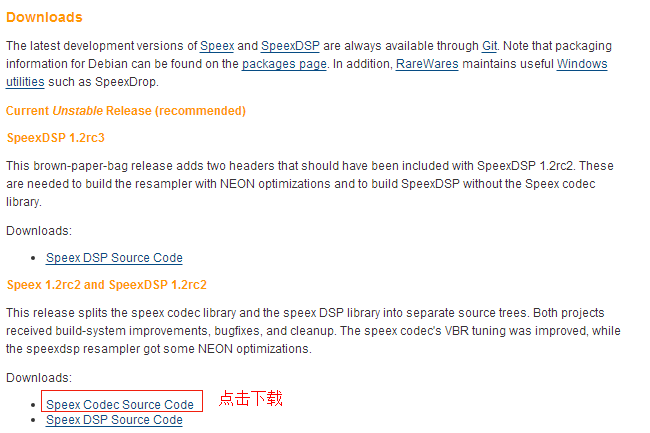
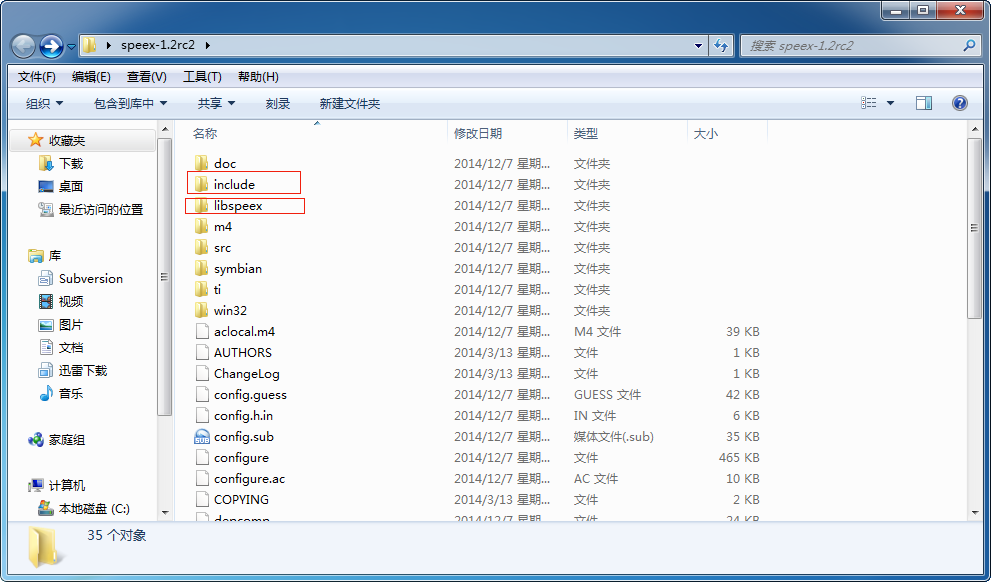
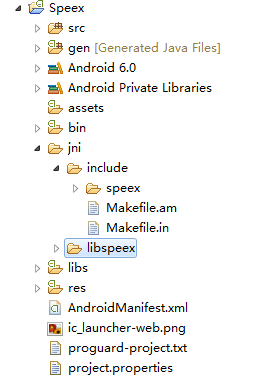
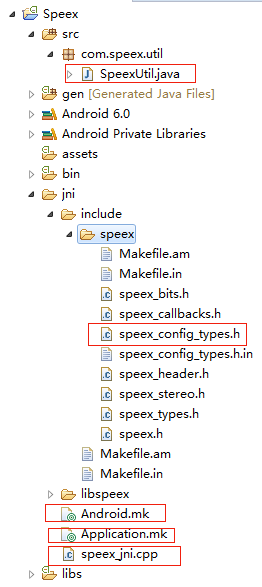
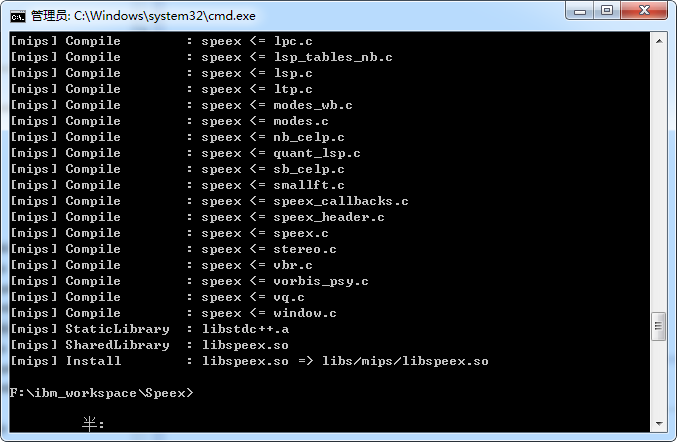
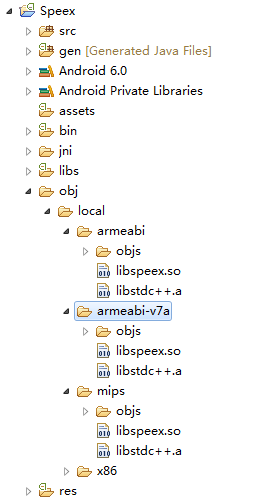
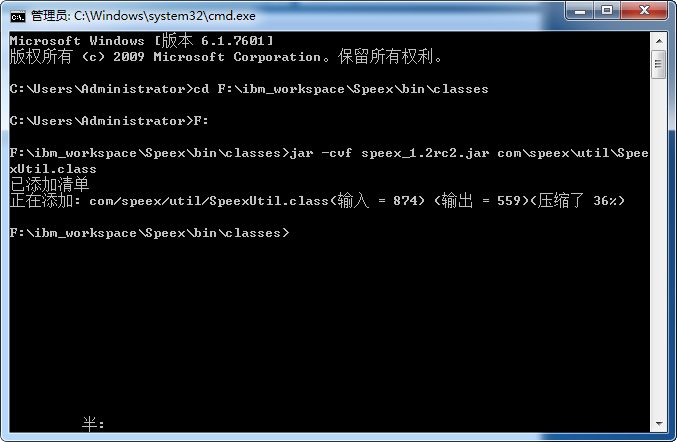














 754
754

 被折叠的 条评论
为什么被折叠?
被折叠的 条评论
为什么被折叠?








